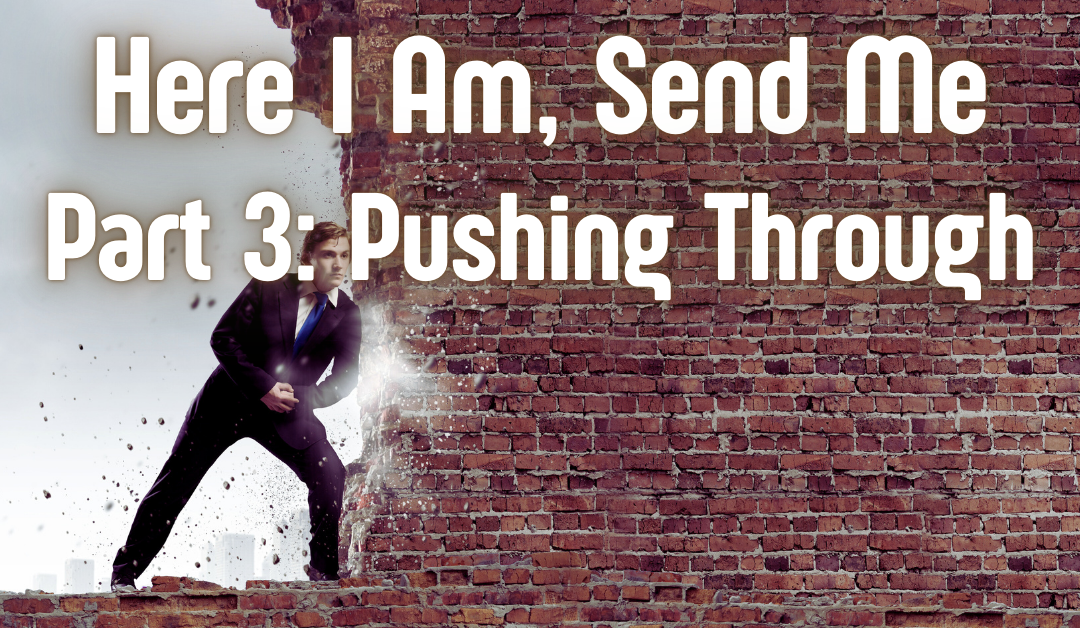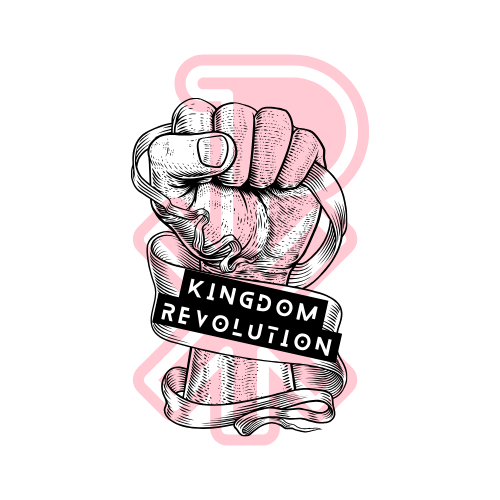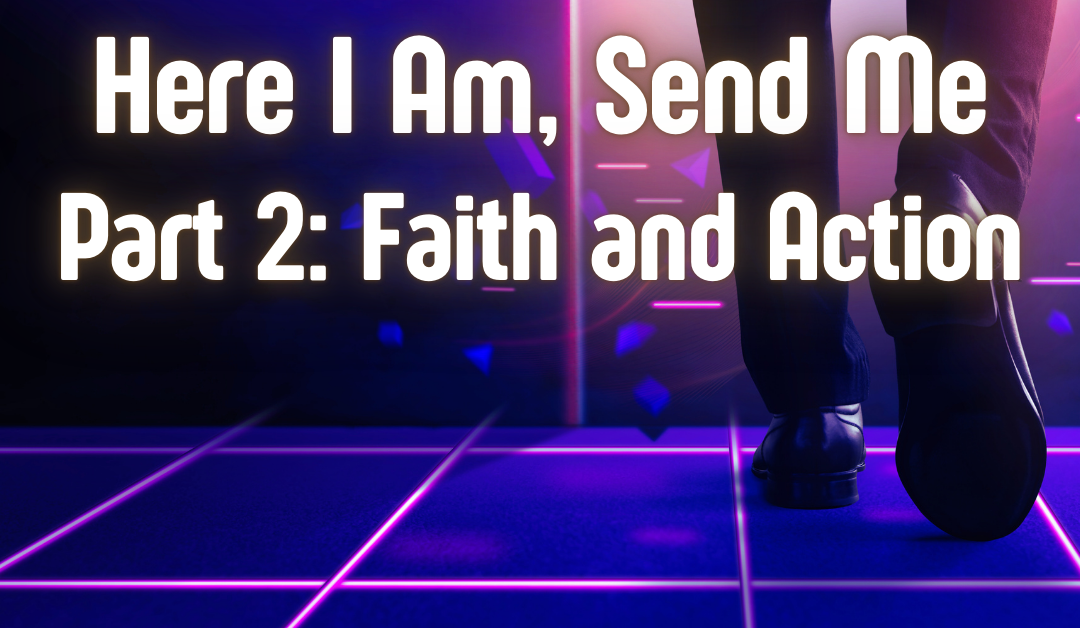
Here I Am, Send Me Part 3: Pushing Through (Faith)
In the previous reading we examined Abraham and the concepts of Faith and Action briefly. Now, let us consider Moses.
Both of these examples – Moses and Abraham – were men called at different times in the history of Israel for different reasons – called for a specific reason, time and place.
Moses was called to act as the saving arm of God – to lead the Israelites out of their Egyptian captivity.
Let’s examine Moses.
His name means “Saved from Water”. I am always astounded by the Biblical names and what they mean – a name, in Jewish culture it would seem, means a lot.
His name is perfect since it serves as a testimony to the fact of who he is – he was saved from a watery death, taken up from the Nile where he was drifting in his basket, by the Pharaoh’s daughter.
It all went down like this:
Up until the death of Joseph – who you might remember as the guy in the Technicolor dreamcoat – the Israelites were pretty happy, growing strong and numerous, apparently making up quite a large part of the Egyptian population. Unfortunately, after Joseph and his generation had died out, a new Pharaoh arose, one who did not know Joseph, and he saw the Israelites as a threat.
And so the children of Israel were plunged into slavery, drawn into a situation of oppression and tyranny. In Ex 1:8-14 we find that they were ‘afflicted’ with ‘heavy burdens’. They became the menial workforce, God’s chosen people building cities for a heathen king. We also find, in v. 12 that the more the Israelites were oppressed, the more they multiplied, and the Egyptians feared them. So, in Ex 1:15-22: the Pharaoh institutes a decree, declaring that all the sons born to the Hebrews are to be cast into the Nile.
Moses is born after the decree has been set, and his mother kept him for three months before letting him go. Pharaoh’s daughter found him and adopted him as her own. By God’s providence (divine intervention) the adversary was ultimately brought down by his own daughter.
When Moses had come of age and was a man he became aware of his people’s suffering, became aware of their burden, and after killing an Egyptian, and Pharaoh finding out about his transgression, he fled to Midian, and took a wife (Zipporah, daughter of Jethro, the priest of Midian).
Exodus 2:23-25 (KJV)
23 And it came to pass in process of time, that the king of Egypt died: and the children of Israel sighed by reason of the bondage, and they cried, and their cry came up unto God by reason of the bondage. 24 And God heard their groaning, and God remembered his covenant with Abraham, with Isaac, and with Jacob. 25 And God looked upon the children of Israel, and God had respect unto [them].
In the ESV that last part reads: God saw the people of Israel – and God knew. God not only knew their situation but also knew how He was going to deliver them…
Meanwhile, while the people of Israel were groaning and grumbling, Moses was tending to the flock of his father-in-law. He led his flock to the west side of the wilderness and came to Horeb, the mountain of God. The angel of the Lord appeared to Him, in the form of burning bush, and Moses went to investigate. When the Lord saw that he had turned aside to see, he started a dialogue with Moses, and the promise of salvation was made.
Exodus 3:21-22: (KJV)
And I will give this people favour in the sight of the Egyptians: and it shall come to pass, that, when ye go, ye shall not go empty: But every woman shall borrow of her neighbour, and of her that sojourneth in her house, jewels of silver, and jewels of gold, and raiment: and ye shall put [them] upon your sons, and upon your daughters; and ye shall spoil the Egyptians.
After much doubt and a spot of low self-esteem, Moses returns to Egypt. The Lord tells Aaron to meet him in the wilderness, and they met at the mountain of God. Moses shared everything with Aaron, and together they went before the elders of Israel. Israel believed and worshipped God!
Moses and Aaron then went before Pharaoh, and confronted him. Pharaoh is angered and increases the workload of the Israelites, causing much doubt and irritation. The people of Israel are now angry, and Moses is made fully aware of their resentment. Moses also starts questioning the purpose God has for him, and the promise of deliverance.
Our God is an awesome God, in the face of adversity His people prosper! God reassures Moses and once again reaffirms the promise of salvation.
The two brothers once again went before Pharaoh. Pharaoh, on this occasion, seeks proof, and demands a sign. Aaron cast down his staff before Pharaoh and his servants and it became a serpent.
The magicians of Egypt however duplicated this effect, also turning their staffs into serpents, but God is all-powerful and none can stand before Him. Aaron’s staff swallowed their staffs.
The fact that Aaron’s serpent devoured the others can be seen as a sign to the probably arrogant magicians, something along the lines of – ‘my God is bigger than your god…’
Pharaoh, however, still refused to heed their request, and his heart was hardened. So began the ten plagues in Egypt. During the first nine Pharaoh continued to disobey and lie, and after the final plague he gave in, his will broken, he chased them from Israel. In Exodus 3:21-22 the promise is made and in Exodus 11:2 it is fulfilled – Israelites are given favor in the eyes of the Egyptians. God makes a distinction between the Israelites and the people of Egypt, and The Passover is instituted.
After all that had to be done was done, at midnight, the Lord struck down all the firstborn in the
land of Egypt. Pharaoh summoned Moses and Aaron by night and told them to take their people and leave. Thus the children of Israel journeyed, and eventually (approximately two months after they took their leave from Egypt), arrived at Mount Sinai.
What strikes me as the most important thought here, after we read the success story, this tale of victory, is his reluctance to serve the Lord and his ongoing doubts and fears throughout. God appears to him and says – Moses, you are going to free my people!
But Moses replies, and eloquent as ever says: Huh? Me?
But the Lord won’t relent and continues – Moses, you will go before Pharaoh and you will convince him to let my people go.
Moses asks: But, Lord, who am I to go to Pharaoh? (And we can almost hear the doubt and fear in his voice.)
The Lord, faithful as ever answers: I will be with you.
In a sense God is saying – be still and know I am God, I am with you – there’s no reason for fear, no reason to be afraid. You are my representative and you will speak nothing but My word – don’t fret, don’t fear, just do what I command you to do – My plan is fail safe and fool-proof. My plan is prosperous.
And Moses, still doubtful and fearing, cries out – Lord, they will not believe me! They will call me a liar!
He’s looking for excuses as his heart cries out saying – I am just a man – with flaws and failures, I can’t do it!
The Lord however says: What is in your hand?
And all Moses has is a rod, a staff… the Lord then goes on to show him how He can use the mundane and ordinary to be extraordinary and miraculous.
All Moses has is a mustard seed of faith – taking a chance – believing the promise of God: I WILL BE WITH YOU. A little bit of faith that God can use the mundane and ordinary to do extraordinary and miraculous things.
Tonight the Lord is saying – It doesn’t matter who you are. Whether you’ve been a liar or an absolute saint, whether you’ve been a thief or a priest – I can use what you have for MY glory.
He says, bring you sorrow, bring your pain, your brokenness – I will use it to establish Myself as the Mighty Savior, the Name above all Names – I will use your flaws and failures, your scars and wounds, to change your life and bless you and those around you.
I have a plan for you, and you don’t have to be afraid, because I know who you are – I am fully aware of what you are and aren’t capable of, and My plan is tailored specifically and uniquely for you.
Take the little bit of faith that you have in your hand right now – that mustard seed of faith – and watch God multiply and increase it through your trust and obedience.
Do as Moses did and have some faith – push through your doubt and fear – put your trust in the One who say ‘I AM’, because ‘HE IS’ everything!
Reflect:
1. What doubts and fears do you have at the moment in regards to your calling? In Exodus 3 and Joshua 1 God makes a very specific promise to His servants. What is this promise and how does this answer your doubts? How does this still your fear?
2. Are there any other promises in God’s Word that you can hold onto to bolster your faith and carry you through? Make a list of these promises and put it somewhere you can see it and be reminded of it daily.
3. When it comes to taking action in regards to our calling it can seem overwhelming at first – we can see the Promised Land of God’s Call, but we often don’t know where to begin. God tells Moses to use what is in his hand. What do you have in your hand right now? This could be resources, contacts, knowledge, skills, talents – even your testimony – what do you have that you can use to make a difference today?
Prayer: Today Lord, give me the assurance that You are with me. Quiet me with Your great love – give me peace. I pray that You will direct me – all my resources and all of my efforts – towards fulfilling the calling You have prepared for me. Show me what it is I can do for You today. Let me be an instrument of Your love and mercy, an ambassador of Your Kingdom, in all of my coming and going – in Jesus Name. Amen.


